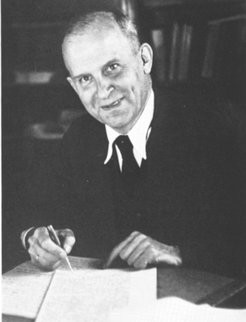Karl Friedrich Bonhoeffer

The full name of our predecessor institute was Max Planck Institute for Biophysical Chemistry – Karl Friedrich Bonhoeffer Institute. Karl Friedrich Bonhoeffer was a physical chemist and the first Director of the Max Planck Institute for Physical Chemistry in Göttingen, which was re-established by the Max Planck Society in 1949. This institute, together with the Max Planck Institute for Spectroscopy, founded later in Göttingen, merged in 1971 to form the Max Planck Institute for Biophysical Chemistry.
The physical chemist Karl Friedrich Bonhoeffer pursued a strongly interdisciplinary approach from an early stage and also applied physical-chemical methods to biological questions. Born in Breslau on January 13, 1899, he completed his doctorate under Nobel Prize winner Walther Nernst. He then began a series of spectroscopic, photochemical, and kinetic studies under Fritz Haber at the Physical-Chemical Institute of the Kaiser Wilhelm Society, which led to his habilitation in 1927. He became an adjunct professor at the University of Berlin, where he discovered parahydrogen.
At the age of 31, Bonhoeffer was appointed to the University of Frankfurt, where he focused primarily on the investigation and production of deuterium-enriched, so-called “heavy” water. In 1934, he took over the chair of physical chemistry at the University of Leipzig. After the Second World War, he campaigned for the reconstruction of the two physical chemistry institutes in Berlin where he had previously worked. In 1949, he took over the management of the newly founded Max Planck Institute for Physical Chemistry in Göttingen, where he conducted research on nerve models and membrane potentials until his death on May 15, 1957.
